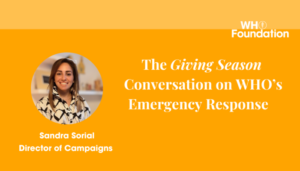The Giving Season Conversation

The year’s end marks Giving Season in a number of countries, when many people decide which causes to support.
Sandra Sorial, Director of Campaigns explains why this year’s Giving Season focus at the WHO Foundation is the life-saving role of WHO in leading the response to health emergencies around the world.
Sandra, can you explain what WHO does in emergencies?
WHO takes the lead in any global health emergency response but this is not widely known.
WHO coordinates humanitarian health efforts with governments, UN agencies, and implementing partners. This encompasses all agencies and actors who have a stake in health, which is, after all, the basis of our survival. This means in those first critical hours of any given emergency: conflicts, earthquake, devastating floods, they need to be ready to oversee that emergency health needs are met. It’s a task of great magnitude and it takes superb coordination, logistical know-how, ready supplies and medical expertise.
Not only that, WHO is usually on the ground before a crisis hits. In Sudan, where conflict erupted in May 2023, they had trained doctors at major hospitals in surgical methods. In Ukraine, WHO was already supporting the COVID-19 response and strengthening health systems before the full scale invasion in 2022. They were among the few agencies still working in northern Syria when the February earthquake caused widespread destruction there and in eastern Türkiye.
WHO is there during the crisis: shipping medical supplies from abroad, delivering them to hospitals, evacuating the most vulnerable people such as children with cancer, and other patients.
They stay after the crisis to restore damaged health systems and to support and train health workers. We want people to know that WHO does the same in each and every country facing a major health crisis, in coordination with partners, as no one can act alone during an emergency.
Why does WHO need support?
For the reasons above, and because it cannot support the number of health emergencies in the world today, without additional funding. It’s understandable that anyone interested in making a real difference needs to assess who to give to and how it impacts the most vulnerable. I have the privilege of speaking to the people in WHO, working directly to support health emergency response, and I am moved by their passion.
Take the Gaza crisis for example: to deliver emergency healthcare, WHO staff members must negotiate the challenge of a violent conflict and an intensely difficult political situation. They are under enormous pressure from all sides but they stick to the principles of humanitarianism. To do this is harder than many people imagine.
I was attracted to take up this role at the WHO Foundation for this reason and several others:
1) WHO has been leading health globally for 75 years.
2) It has a presence in more than 150 countries and its investment in healthcare goes beyond treating immediate needs, to anticipating outbreaks of infectious disease and supporting governments to maintain health services in the face of chaos and destruction.
3) Its global thought leadership combined with local expertise is highly effective.
4) Its purchasing power means it can negotiate prices and achieve economies of scale when supplying medicines and healthcare equipment for millions of people in need. This unique combination helps every donation to go further.
What is the most enjoyable problem you face in your role?
I would say it is finding a way to bring to life a complex topic or issue in a way that everyone can understand, relate to and support. The public image of WHO is one of officials sitting in press conferences, yet this doesn’t do justice to their work as first responders for health in emergencies.
For Giving Season, we have developed a concept around ‘seeing the full picture’. While people are familiar with images of wounded or vulnerable people in emergencies, the campaign offers an insight into what goes on behind the scenes. This includes the aid being delivered, health workers on the frontline and the sheer scale of coordinating multiple partners involved. WHO plays this coordinating role for health. Without coordination, agencies cannot deliver healthcare efficiently, they block critical transport routes, and they take up the time of officials in the countries affected: time that can be better spent helping the people who need it.
The message of our publicity campaign is one of hope that, in any given emergency, no one should have to face it alone.
Has anything surprised you about taking up this role at the Foundation?
Yes, pleasantly! Having come from organizations that have long-established fundraising operations, I was surprised by the success of the Foundation in such a short amount of time. Forty thousand donors have supported our campaigns, particularly Go Give One, in less than two years.
Imagine the equivalent of a packed football stadium of people saying “yes we want to do more” to help. In a time of crisis, they came together to stand for vaccine equity. That’s moving and encouraging.
What else can people do to help, besides donating?
Donating money helps hugely because the costs of functioning in chaotic and dangerous environments are high, but it is not the only way to help. People lending their voices is just as important. If you are passionate about a cause, you speak to your friends and family about it, and multiply the awareness of it by a factor of ten. You might find ways to engage your company. Perhaps you are a senior executive who can influence social impact decisions to further the cause.
Finally, you can help by understanding the issues. Inaccurate information and misinformation breeds misunderstanding. Sadly it is increasingly widespread and this works against us trying to solve problems. Starting conversations that shed light on different realities and question assumptions can go a long way.